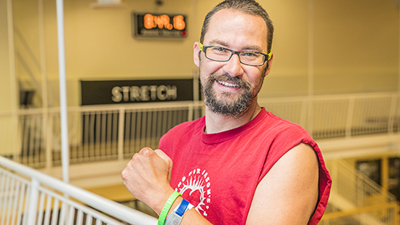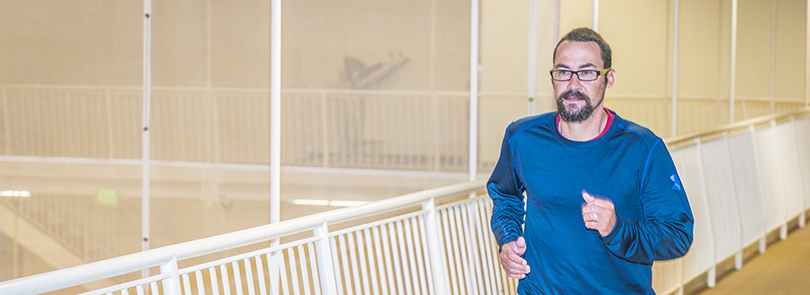Congenital Heart Defect Leads to Transplant

Growing up, Jason Ewen always knew his heart was a little different. He could participate in most activities, like camping, fishing and hunting. But when it came to sports, Ewen knew he’d have to stay on the sidelines.
“I could not run one lap around the track. I had to walk,” says Ewen, who was born with a type of congenital heart disease (CHD) known as transposition of the great arteries, which required three open-heart surgeries before his second birthday.
Fifty years ago, babies born with serious heart abnormalities rarely lived past childhood. Today, thanks to advances in diagnostic strategies and surgical techniques, Ewen, now 43, is one of roughly 1.5 million adults in the U.S. with CHD, and he’s among one of the fastest-growing patient populations in the country.
Unique Challenges
Almost one in 100 children is born with an abnormally developed heart. Problems can include a hole in the heart, missing valves, underdeveloped chambers and everything in between. But with so many variations, treating adults with CHD can be a challenge because no two patients are alike.
A Strong Team
To become certified in adult congenital heart disease, physicians can take one of two paths: An adult cardiologist can do two years of pediatric cardiology training, or a pediatric cardiologist can do two years of adult cardiology training.
A top-rate surgical team is necessary, too. Most congenital heart diseases require surgery early in life, often just days birth.

A New Baby and a New Heart
When CHD patients reach adulthood, they may be faced with a variety of possible complications, such as heart rhythm problems, heart failure or the possibility of stroke. But it’s not only health issues that they have to manage. Insurance, employment and disability benefits can also prove cumbersome.
Family planning is another big issue. Patients want to know if their child could have a heart defect, too.
Most congenital heart patients’ babies have about a 5 to 10 percent chance of having CHD, regardless of whether the mother or the father has CHD. At the University of Maryland Medical Center’s Fetal Heart Program, fetal ultrasound can show these defects at about 12 weeks of pregnancy.
For the first 15 years of his marriage, Jason Ewen was skeptical about having kids because of his heart defect. Aside from physical limitations, he had a relatively normal childhood. But in his early 20s, Ewen began experiencing complications.
That’s when Ewen was diagnosed with atrial fibrillation, a rapid heart rate that causes poor blood flow. His was 180 beats per minute. (A normal heart rate is 60 to 100 beats per minute.) A procedure known as cardioversion and new medications helped him regain a normal rate.
In 2006, Ewen’s heart stopped while he was in the emergency room, and he had to be resuscitated. A defibrillator was implanted, new medications were prescribed, and checkups became very regular.
Then Ewen developed congestive heart failure in 2015 and required three hospital trips in one month. It became apparent that a heart transplant was necessary.
But talk of the transplant coincided with another surprise: Ewen and his wife, Ellen, were going to have a baby. A fetal heart screening showed that their child did not have a heart defect. Two weeks after his son Banner-Wolf’s birth, Ewen was moved up the transplant list.
Two months later, Ewen received the call that there was a match: the University of Maryland Medical Center had a heart for his transplant.
Now, Ewen is doing what he couldn’t do his whole life: jogging more than a mile while training for a 5K.
“If you have a heart disease or condition, don’t let it stop you and hold up your life from doing what you enjoy,” Ewen says. “If you can do it, enjoy it, because you don’t know what tomorrow’s going to bring.”
